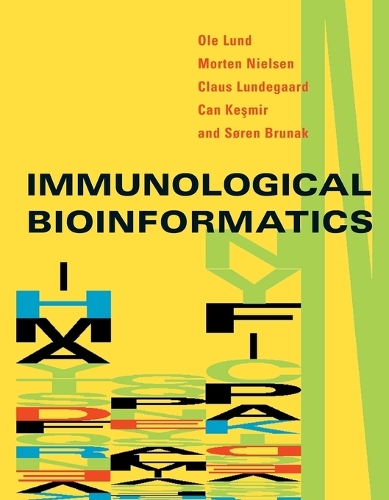
Immunological Bioinformatics
(Paperback)
Publishing Details
Immunological Bioinformatics
By (Author) Ole Lund
By (author) Morten Nielsen
By (author) Claus Lundegaard
By (author) Can Kesmir
By (author) Sren Brunak
MIT Press Ltd
MIT Press
6th February 2024
United States
Classifications
Professional and Scholarly
Non Fiction
Molecular biology
Biotechnology
Medical and health informatics
571.960285
Physical Properties
Paperback
312
Width 178mm, Height 229mm
369g
Description
Despite the fact that advanced bioinformatics methodologies have not been used as extensively in immunology as in other subdisciplines within biology, research in immunological bioinformatics has already developed models of components of the immune system that can be combined and that may help develop therapies, vaccines, and diagnostic tools for such diseases as AIDS, malaria, and cancer. In a broader perspective, specialized bioinformatics methods in immunology make possible for the first time a systems-level understanding of the immune system. The traditional approaches to immunology are reductionist, avoiding complexity but providing detailed knowledge of a single event, cell, or molecular entity. Today, a variety of experimental bioinformatics techniques connected to the sequencing of the human genome provides a sound scientific basis for a comprehensive description of the complex immunological processes. This book offers a description of bioinformatics techniques as they are applied to immunology, including a succinct account of the main biological concepts for students and researchers with backgrounds in mathematics, statistics, and computer science as well as explanations of the new data-driven algorithms in the context of biological data that will be useful for immunologists, biologists, and biochemists working on vaccine design. In each chapter the authors show interesting biological insights gained from the bioinformatics approach. The book concludes by explaining how all the methods presented in the book can be integrated to identify immunogenic regions in microorganisms and host genomes. Using bioinformatics methods to generate a systems-level view of the immune system; description of the main biological concepts and the new data-driven algorithms. Despite the fact that advanced bioinformatics methodologies have not been used as extensively in immunology as in other subdisciplines within biology, research in immunological bioinformatics has already developed models of components of the immune system that can be combined and that may help develop therapies, vaccines, and diagnostic tools for such diseases as AIDS, malaria, and cancer. In a broader perspective, specialized bioinformatics methods in immunology make possible for the first time a systems-level understanding of the immune system. The traditional approaches to immunology are reductionist, avoiding complexity but providing detailed knowledge of a single event, cell, or molecular entity. Today, a variety of experimental bioinformatics techniques connected to the sequencing of the human genome provides a sound scientific basis for a comprehensive description of the complex immunological processes. This book offers a description of bioinformatics techniques as they are applied to immunology, including a succinct account of the main biological concepts for students and researchers with backgrounds in mathematics, statistics, and computer science as well as explanations of the new data-driven algorithms in the context of biological data that will be useful for immunologists, biologists, and biochemists working on vaccine design. In each chapter the authors show interesting biological insights gained from the bioinformatics approach. The book concludes by explaining how all the methods presented in the book can be integrated to identify immunogenic regions in microorganisms and host genomes.
Author Bio
Ole Lund is Associate Professor and leader of the Immunological Bioinformatics group at the Center for Biological Sequence Analysis at Technical University of Denmark. Morten Nielsen is Associate Professor at the Center for Biological Sequence Analysis at Technical University of Denmark. Claus Lundegaard is Associate Professor at the Center for Biological Sequence Analysis at Technical University of Denmark. Can Kesmir is Assistant Professor in the Department of Theoretical Biology at Utrecht University. S ren Brunak is Professor and Director of the Center for Biological Sequence Analysis at the Technical University of Denmark.
